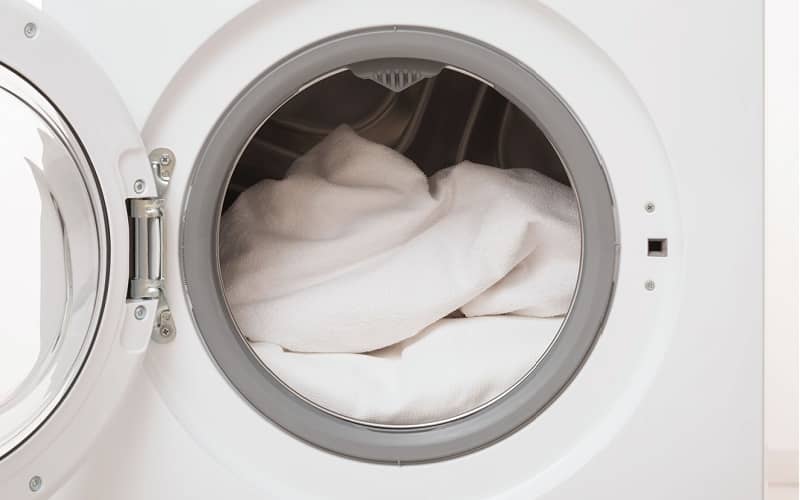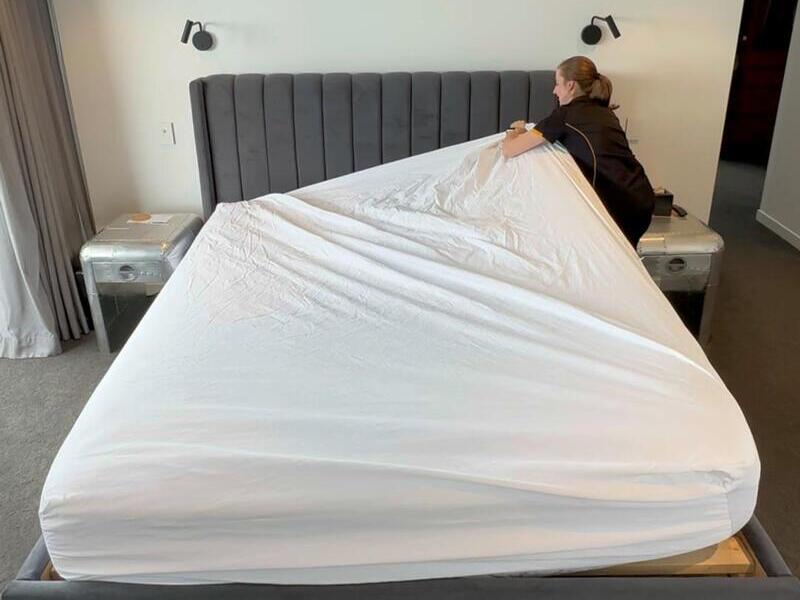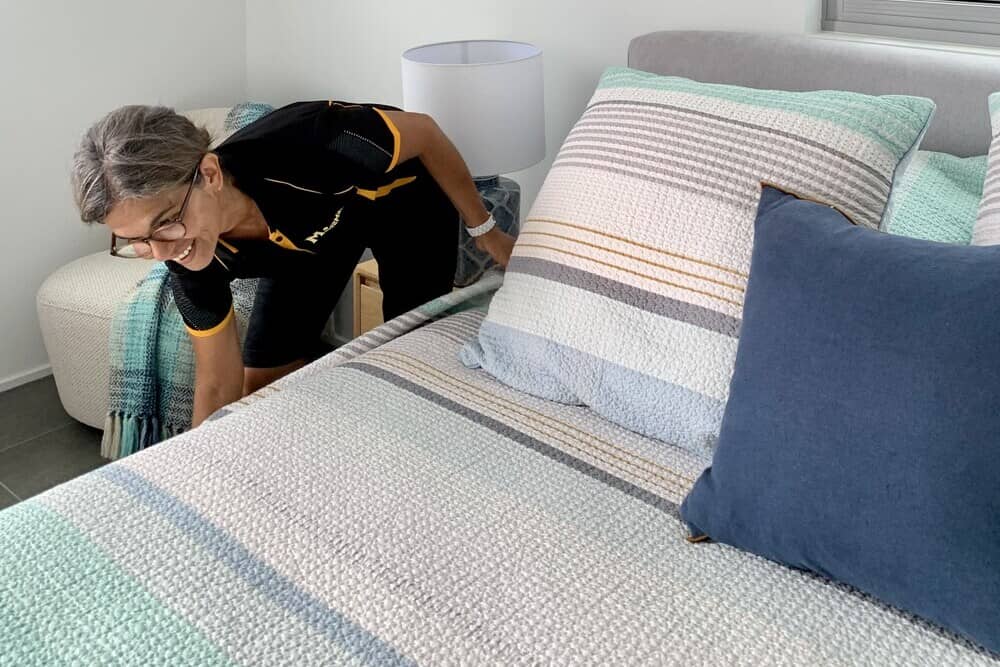Most health experts recommend changing your sheets every week. This includes fitted and flat sheets, as well as pillowcases.
We know that’s more often than many of us would like. But even if your bed sheets look spotless, allergens and bacteria could be lurking on the fabric.
For people with sensitive skin or pets, changing the sheets more frequently is even better.
Of course, you don’t have to wash your sheets right after stripping them if you have a spare set!
So, how often should you wash your sheets?
We explain how often and why — plus tips for when to wash right away and when it’s okay to wait a little longer.
When to Wash Right Away | When to Change More Often | Washing Less Often | How to Wash Sheets | Washing Other Bedding
How Often Should You Change Your Sheets?

It’s best to change your sheets once a week.
Clean sheets are key to a good night’s sleep. They can also prevent potential health issues.
Every day, your body sheds about half a teaspoon of dead skin cells. Some of these end up on your sheets while you sleep.
Other things that can add to the build-up include:
- Pet dander and hair
- Messes from food and drinks
- Bodily fluids like oils and sweat
Unfortunately, all these can lead to bacteria and dust mites.
As these microorganisms multiply, they can trigger allergies and cause skin irritation.
Changing your sheets weekly minimises allergens and bacteria in your bed.
We get it, though — that much laundry sounds daunting!
To stay on top of your chores, consider booking a house cleaning service. They can handle your laundry and keep your home sparkling.
When to Wash Your Sheets Right Away
Changing sheets weekly is a good rule of thumb. But sometimes, you’ll need to change then wash your sheets immediately.
Strip your sheets right away if there are stains like blood, sweat, or food. Pre-treat the mess before washing the rest of the sheets.
Do the same if you or someone else has been sick. Once you’re able, wash the sheets to kill germs and control the spread of disease.
Also, don’t wait to wash your sheets if you sweat a lot the previous night or if you notice a bad smell from your bed.
When to Change Sheets More Often

Replacing your sheets once a week might not be enough in some cases. It all depends on your health, lifestyle, and preferences.
If you have allergies, sensitive skin, or other health concerns, swapping out your sheets every 3–4 days can help.
You might also need to change your sheets more frequently if:
- You eat in bed
- You sweat a lot at night
- Your pets sleep on the bed
- Your kids love playing on the bed
Can You Wash Sheets Less Frequently?
Washing less often is fine for beds that are rarely used, like those in guest rooms. Just be sure to change the sheets right away after someone stays over.
You can also hold off on washing if you’ve been away and haven’t slept at home.
Having a spare set of beddings helps, too. That way, you can change them weekly without rushing to do the laundry.
But if you only have one set and weekly laundry isn’t possible, you can wash sheets every two weeks — but only for fitted and flat sheets.
To help keep your beddings fresh between washes:
- Do not snack in bed
- Shower before bedtime
- Vacuum your sheets every few days
- Keep kids and pets out of the bedroom
- Avoid lotions or fake tan products before bed
However, pillowcases should still be washed at least once a week. Remember: they directly touch your face and hair.
Oils from your hair can transfer to your pillowcases and then to your skin. Over time, this may cause breakouts or other skin concerns.
Pillowcases can also collect saliva and sweat stains, so frequent washing is a must.
How to Wash Bed Sheets Properly

How to wash bed sheets depends on the type of fabric.
Bamboo and silk may need special care, while cotton and linen are usually more durable. Always check the label first for specific instructions.
Before doing the laundry, pre-treat any stains using a compatible stain remover. Heat from the washer or dryer can set stains and make them harder to remove.
Always wash sheets separately, and avoid overloading the machine for thorough cleaning.
Most sheets do well on a gentle cycle with mild detergent and cool water. To whiten sheets, add half a cup of baking soda to the wash.
Afterwards, line-dry sheets in a shaded area. Once done, fold the sheets neatly and keep them in a cool, dry place.
How Often to Wash Other Bedding
Besides the sheets, the rest of your bedding needs regular cleaning, too.
Here’s how often to wash your other bed linens:
- Pillows: Every 3–6 months
- Mattresses: Every 4–6 months
- Mattress protectors: Every 2 months
- Blankets and doonas: Every 3–4 months
- Doona covers (or duvet covers): Every 1–2 weeks
These are just general guidelines. How often you wash other bedding depends on your lifestyle and preferences.
Don’t forget to check the care labels, especially for delicate or special material.
FAQs on Sheet Washing Frequency
Below, we answer the top questions about how often to wash sheets!
Is it okay to change your bed sheets once a month?

Changing your bed sheets once a month is not advisable. The general rule is to wash sheets weekly.
However, you can go longer between washes for beds that are not used often. Just make sure to lay a flat sheet over the bed to help keep dust out.
How often does the average person change their bedding?
According to a survey by Sleep Advisor, the average person changes their sheets every 24 days. This is not the ideal frequency!
Change your sheets weekly for better, comfier sleep.
How often do Australians wash their sheets?
A 9Honey poll revealed that 41% of Aussies wash their sheets weekly, while 37% do so fortnightly.
It looks like many Aussies take bed sheet hygiene seriously!
What happens if you don’t change your bed sheets regularly?
If you don’t change your sheets regularly, you create a breeding ground for bacteria, bed bugs, and dust mites.
These tiny creatures like to feed on body oils, dead skin cells, and sweat that accumulate on the bed.
Over time, dirty sheets can lead to allergy and asthma flare-ups. They can also cause acne breakouts and skin rashes.
A build-up of allergens and germs doesn’t just make your bed less inviting. It can also affect your sleep and overall health!

